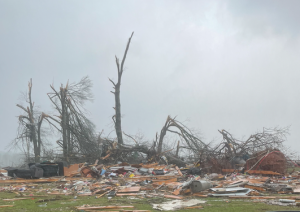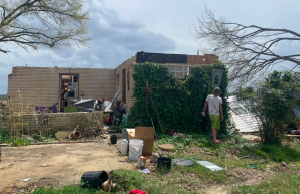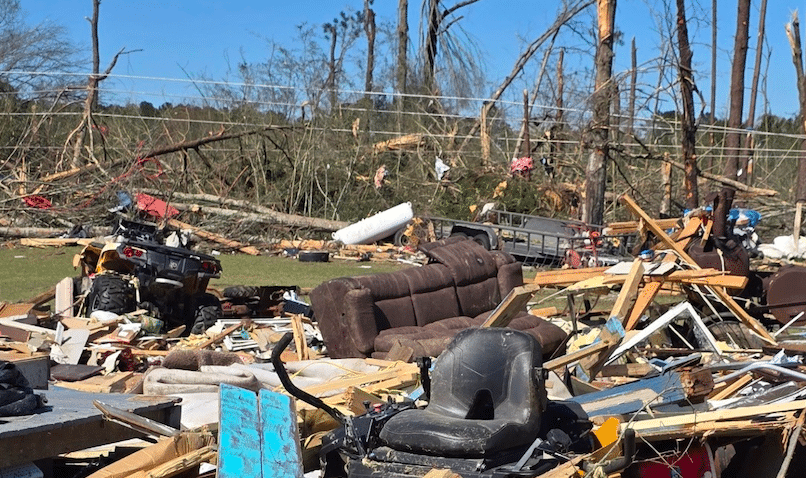It’s been nearly a month since severe storms and tornadoes pillaged much of Mississippi, leaving seven people deceased, dozens injured, and thousands without a home or business. Yet, a request for federal aid has not been approved by the White House.
On March 14 and March 15, Mississippi had 18 confirmed twisters pass through, devastating a litany of communities statewide. One area in particular, Walthall County, took the brunt of the hit with 157 homes being damaged and two people succumbing to injuries sustained from the inclement conditions.

On April 1, after damage was fully assessed, Gov. Tate Reeves sent a request for individual and public assistance to the federal government. If approved, funds would be used to assist in setting up temporary housing, allowing homeowners to secure low-cost loans for repairs, and to aid in the efforts of nonprofits to make repairs to infrastructure and meet other needs of those affected by the storms.
Despite a total loss of shelters, vehicles, and other necessary belongings for some residents in the impacted areas, the federal government has remained mum. At the local level, the Mississippi Emergency Management Agency sent surveyors to the area to do a damage report, but residents decry a perceived lack of additional movement by the state agency.
“They’ve got so much bureaucracy to fool with. We’ve got to find some way to cut through this. This is three weeks going on now that these people have been living with their mom or their uncle, or somebody has donated them a place to stay,” Bobby McGinnis, a volunteer firefighter in Walthall County, told SuperTalk Mississippi News.
“Where does this stop? Do we have to go a month or two without relief? We’ve got to be able to cut through this red tape. Where is this FEMA designation? Is it sitting on the president’s desk? Is it hung up in MEMA? While you’re dragging your feet and sitting on your hands…people are suffering.”

After the storms had passed through Walthall County, McGinnis equated the scene to the aftermath of war. With trees and limbs covering all major and back roads, first responders were without the immediate capacity to attend to those in need. In essence, residents were left on an island without a quick remedy.
“All these people that were hurt were pretty much on their own,” McGinnis said, acknowledging that many first responders like him felt helpless. “What’s so scary about a tornado like this, or two in this case, is that you can’t get to the victims because they’re isolated. You just can’t get to them.”
That was until local county supervisors and others worked diligently to clear the roadways to provide a clear path for first responders to make their way to the various spots that had encountered what no person would wish on their worst enemy. Then, the community stepped up to the plate. A litany of churches, charities, community members, nonprofits, and officials from nearby counties swooped in to provide food, clothing, medical care, and other essential services to the people of Walthall County.

Pointing to entities like Eight Days of Hope, Southern Baptist Disaster Relief, and Mercy Chefs, among others, McGinnis emphasized that the selfless acts and overwhelming support from charitable individuals and nonprofits made a world of difference in not only boosting morale but also aiding in the survival of residents.
“Wow. These people know what’s going on. They’re on the ground, and they’re doing what they have to do. We had people come from everywhere bringing food and other supplies,” McGinnis said. “That’s how this disaster went. It went from need to somebody stepping in to meet that need. This happened all over our county. It was just people helping each other. That’s what it comes down to.”
But the community support only goes so far, if you ask McGinnis. Giving someone food to eat, clothes to wear, and medical care does not magically construct a new house or repair an existing residence. Though private donations and assistance were admirable and graciously received, the public remains in need of help that can only come from the federal government.
“I had some friends donate a camper to a local who did not have insurance. That’s happening throughout the county — small donations of campers and places to stay,” McGinnis said. “That’s what’s going on now, but as far as any kind of help from FEMA housing or Red Cross shelters, that’s not happening. I don’t know where the Red Cross is, but they got lost in the shuffle somewhere.”
In the meantime, President Donald Trump has approved disaster declarations for Arkansas, Kentucky, and Tennessee in response to severe weather that pillaged those states on April 2. However, FEMA confirmed to SuperTalk Mississippi News that the Magnolia State’s request from the mid-March storms and tornadoes is still under review. No timeframe has been given as to when the request will be approved or denied. Gov. Reeves did not respond to a request for comment on the matter.
“We’re just working folks trying to make it, and we need some help,” McGinnis concluded.







